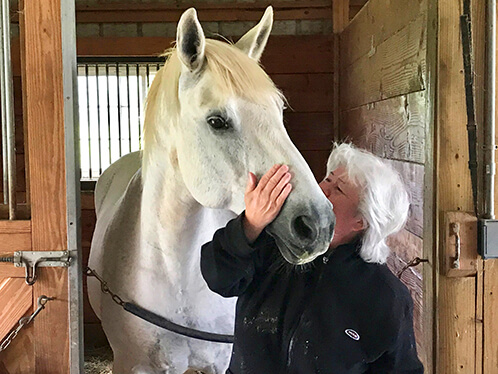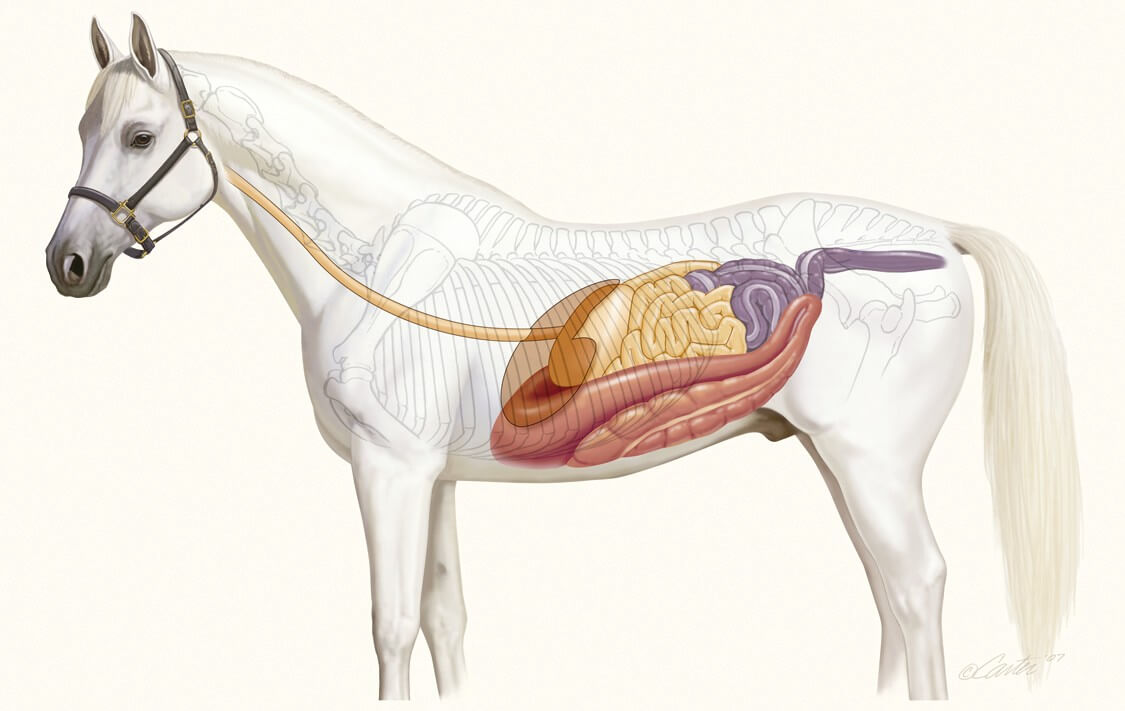Gastric ulcer treatment for equines runs the gamut from commercially and home-produced pastes and potions, to off label use of medications in cocktails and concoctions. Whenever you administer medications or supplements to your horse, it goes without saying (or does it?), that following the manufacturer’s instructions for the duration and directions for a product’s use is a keen priority for any responsible horse owner.
While both the safety and efficacy of any horse health related product, especially one to be ingested by the horse, depends on ‘following the rules’, in real life horse trainers, competitors and equine owners often figure more is better. Prescribed limits of a few weeks administration of a paste remedy, turn into months of use.
Equine gastric ulcer care is sometimes managed by the well-meaning horse caregiver by the creative though contraindicated method of the cocktailing of multiple ulcer treatments and throwing them into the horse willy-nilly. Obviously mixing together medications in the hope of brewing a more potent means of preventing or curing an ailment isn’t the brightest idea. But the prevalence of the practice belies the frustrations of equestrians particularly in the performance horse world trying their best to deal with the often-inconvenient interruption to the training of their equines stymied by the finding of equine gastric ulcer syndrome {EGUS}. An expensive approach and one that can also do severe damage to the horse’s health.
When a health problem raises its ugly head in relation to our beloved equine partners, it’s human nature to want to fix it, and want to fix it fast. Let’s face it, what horse owner among us hasn’t reached for the ‘bute’ tablets and then created our own concoction to paste the horse utilizing the popular over the counter pink antacid medication we find in our own bathroom cabinets? Or read a paste tube of dewormer and denounced the need to weight tape our horses and match the amount of product given to the actual weight of the horse standing in front of us. “It has a good margin of safety,” we’ll say to convince ourselves all will be well as we knowingly over medicate our trusting wee beastie.
The fact is that prolonged use of even research-backed products to treat gastric ulcers can play havoc with the horse’s microbiome, can negatively affect the horse’s immune health system, its energy metabolism and ability to digest fiber.
To make matters worse, many horse owners and trainers treat their horse for ulcers that the horse doesn’t actually even have and EGUS has not been properly diagnosed as the causative health issue the horse is experiencing. Only endoscopic exam can confirm or deny the presence of ulcerations, lesions, and erosions in the terminal esophagus, stomach, or proximal duodenum of the horse.
Thankfully today most horse caregivers realize the most common errors in horse management protocols that give rise to EGUS. Horse folks realize the common practice of intermittent forage feeding that leaves a horse’s stomach empty for long periods during the day increases the likelihood of this grazing animal to develop ulcers due to the buildup of hydrochloric acid in its stomach and have taken measures to adapt the feeding regime of their horses. But this protocol change alone does not resolve the increased risk of succumbing to EGUS for the modern-day horse.
Sadly, there is much misleading information bandied about in regard to how to prevent and successfully treat ulcers. This makes the task of solving the significant and increasingly widespread problem of EGUS ever more difficult to navigate for horse owners. Claims by certain horse supplement manufacturers about their digestive supplements preventing or curing ulcers do little to help the horse, though may significantly improve the manufacturer’s bottom line.
It is essential for your horse’s well-being and long term health to learn the facts about gastric ulcers, why they happen and how to diagnose and treat them effectively.
Being on the right track in your horse care management practices can do much to mitigate the likelihood of EGUS erupting in your horse at all, and if it does, knowing the way to get your horse back to looking and feeling his best is a giant stride forward in not wasting your time and money or negatively impacting your horse’s welfare.
About Grand Meadows: Founded in 1989 by visionary Angela Slater, Grand Meadows is a leading horse health product and equine supplement manufacturer driven by the guiding principle of providing affordable, extremely high-quality science-backed horse products to help ensure horses look and feel their best.
For the past 35 years the company’s mission has been honored and developed further, by President Nick Hartog, who among other accomplishments is one of the founding members and current board member of the National Animal Supplement Council (NASC), an organization that has a profound impact on the safety, transparency, and legitimacy of the animal supplement industry.
Grand Meadow products are widely used and trusted across the entire horse community from Olympic medal winning competitors and successful horse racing trainers to backyard horse owners. Their equine supplements are highly regarded for their excellent quality resourced ingredients and completely accurate labelling and effective formulations. Learn more at https://www.grandmeadows.com
Nikki Alvin-Smith is a seasoned writer/content creator who loves to share her lifelong experience with everything horse, farm, and travel. Her experiences as an international-level Grand Prix dressage competitor, coach, and worldwide clinician provide educational truths and fun moments to share. She and her husband, Paul, live in the beautiful Catskill Mountains of New York and operate an organic hay farm and dressage yard. Visit nikkialvinsmithstudio.com to learn more about her affordable services.
PLEASE NOTE: AHP members ~ Please share this content. Kindly include Grand Meadows URL and author’s URL wherever published. Please advise use so we can share your platform too. Feel free to contact Nikki Alvin-Smith for further information and high res photos.

Nikki Alvin-Smith is a seasoned freelance writer who loves to share her lifelong experience with everything horse, farm and travel. Her work has been printed in more than two hundred fifty equestrian magazines worldwide and her published articles number in the thousands including travel and lifestyle press.
A Brit who has called New York home for more than 37 years, Nikki brings a unique perspective to her writing.
Her experience as an international level Grand Prix dressage competitor, coach and worldwide clinician, with a youth spent showjumping and foxhunting, provides lots of educational truths and fun moments to share with the reader. Additionally, she has been a horse breeder and importer of Hanoverian, Dutch and Iberian horses for more than 25 years.
Visit nikkialvinsmithstudio.com to learn more.

